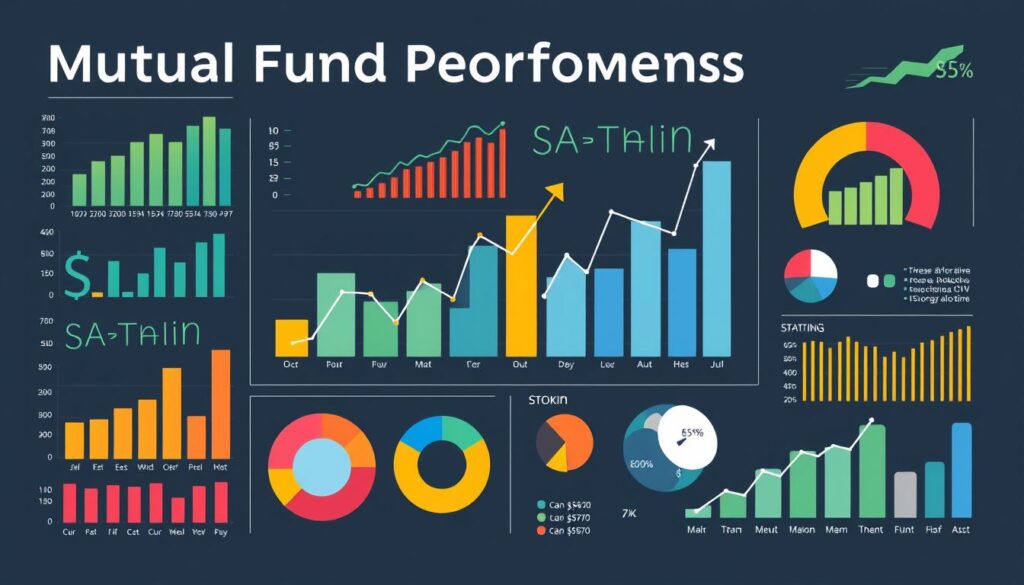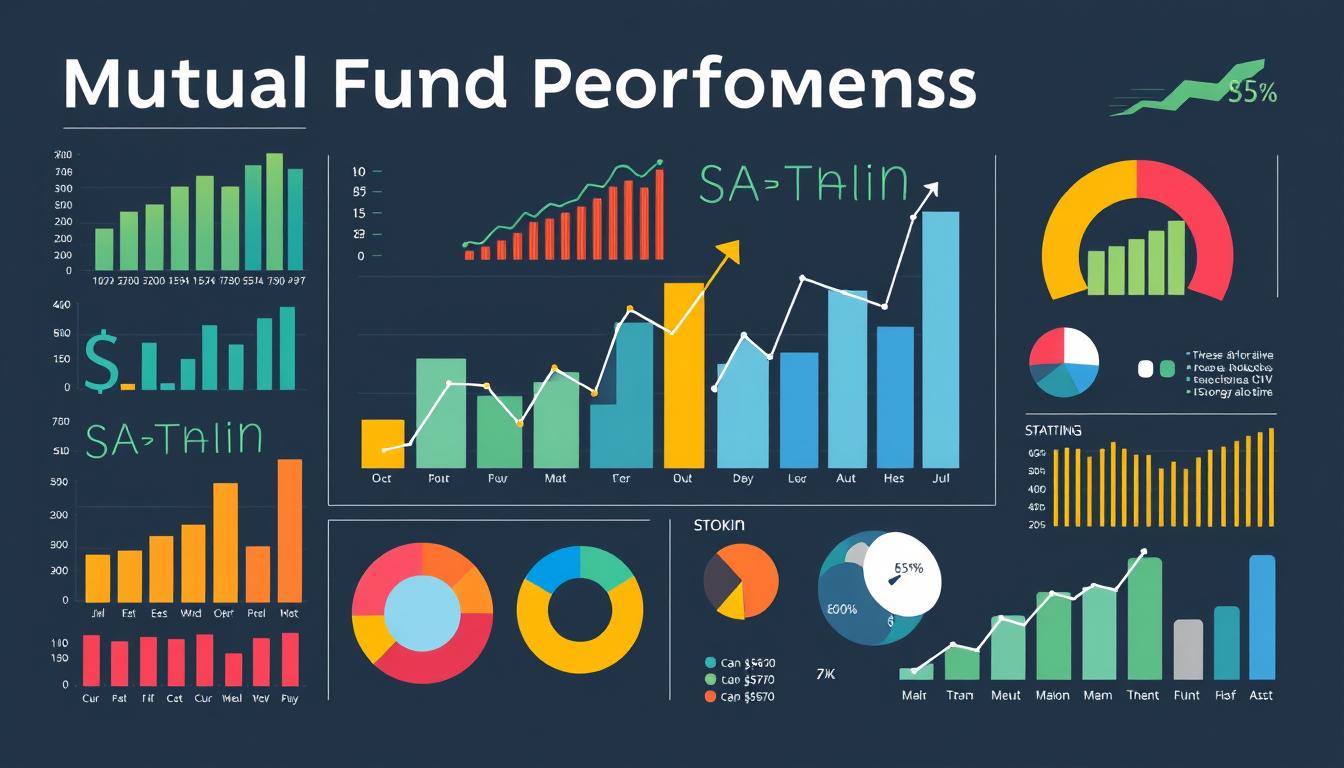What’s the role of mutual funds in the stock market? Investing in the stock market can be tough for individuals. Mutual funds make it easier. They combine your money with others to invest in many stocks, bonds, and securities. Experienced fund managers handle this, giving you access to opportunities you might not find on your own.
Mutual funds are key in the stock market. They let you join in on the market’s growth and potential earnings. Whether you’re new to investing or have experience, mutual funds can change the game for your wealth growth.

Key Takeaways
- Mutual funds provide a diversified approach to investing in the stock market.
- Professional management of mutual funds can help navigate the complexities of the market.
- Mutual funds offer an accessible way for individual investors to participate in the stock market’s potential growth.
- Investing in mutual funds can help you achieve your long-term financial goals.
- Mutual funds play a crucial role in providing liquidity and stability to the overall stock market.
Understanding Mutual Funds: Your Gateway to Stock Market Investing
Mutual funds make it easy for people to invest in the stock market. They offer different types of investments to fit various goals and risk levels. You can choose from equity funds for stocks, bond funds for fixed income, or balanced funds for a mix of both.
Types of Mutual Fund Investments
- Equity Funds: These funds mainly invest in stocks. They offer the chance for growth and income through dividends.
- Bond Funds: These focus on bonds, providing a steady income stream.
- Balanced Funds: They mix stocks and bonds. This aims to balance growth and risk.
Basic Components of a Mutual Fund
A mutual fund has a fund manager who picks and manages the investments. The expense ratio covers the fund’s costs. The net asset value (NAV) shows the fund’s asset value and share price.
How Mutual Funds Are Managed
Mutual funds can be actively or passively managed. Active management means the fund manager tries to beat the market. Passive management follows a specific index. The manager’s strategy and the fund’s goals and risk level affect its performance.
| Fund Type | Investment Focus | Potential Risks and Returns |
|---|---|---|
| Equity Funds | Primarily stocks | Higher risk, potential for higher returns |
| Bond Funds | Primarily fixed-income securities | Lower risk, lower potential returns |
| Balanced Funds | Combination of stocks and bonds | Moderate risk, moderate potential returns |
“Investing in mutual funds is a great way to diversify your portfolio and gain exposure to the stock market, without the need to research and manage individual securities.”
What’s the Role of Mutual Funds in the Stock Market?
Mutual funds are key in the stock market. They help investors join in the market’s growth. By combining money from many investors, mutual funds make it easier for individuals to invest in a wide range of securities.
Mutual funds also manage capital well. They use the money to invest in different areas, which helps the market work better. This way, they support the health of the financial system.
Furthermore, mutual funds have a big say in corporate governance. Their managers work with company leaders to make sure investors’ interests are looked after. This is a big part of how mutual funds shape the stock market.
| Role of Mutual Funds | Description |
|---|---|
| Market Participation | Facilitating broader investor access to the stock market through pooled investment vehicles |
| Capital Allocation | Directing capital to various sectors and industries, influencing price discovery |
| Corporate Governance | Engaging with company management to advocate for investor-friendly policies |
Knowing how mutual funds work in the stock market helps investors see their value. They play a big role in the financial world.

Benefits of Investing in Mutual Funds Over Individual Stocks
Mutual funds have many advantages over picking individual stocks. They offer expert management, better risk mitigation, and are more cost-effective. This makes them a great choice for both new and experienced investors.
Professional Portfolio Management
Mutual funds are managed by skilled professionals. They use their knowledge to create and manage a diverse portfolio. This expert management helps reduce the risks of investing in individual stocks.
Risk Diversification Advantages
Investing in a mutual fund means you get to own a piece of many different securities. This risk mitigation helps spread out the risk. Mutual funds often include stocks, bonds, and other assets for a balanced portfolio.
Cost-Effective Investment Options
Mutual funds offer a wide range of investments at a low cost. This cost-effective investment option is great for long-term dollar-cost averaging. Regular, consistent investments can grow over time.

| Benefit | Description |
|---|---|
| Expert Management | Mutual funds are managed by experienced professionals who actively monitor the market and make informed investment decisions on behalf of investors. |
| Risk Diversification | Mutual funds hold a diverse portfolio of securities, reducing the overall risk compared to investing in individual stocks. |
| Cost-Effective Investing | Mutual funds leverage economies of scale to provide investors with access to a wide range of investment opportunities at a relatively low cost, making them a cost-effective investment option. |
| Dollar-Cost Averaging | Mutual funds allow investors to implement a dollar-cost averaging strategy, where regular, consistent investments can compound over time. |
How Mutual Funds Impact Market Liquidity and Stability
Mutual funds are key in making the stock market more liquid and stable. They trade securities a lot, which boosts trading volume and market efficiency. This helps stock prices reflect the true value of companies, keeping the market healthy.
As institutional investors, mutual funds use big money and smart strategies. Their big trades help reduce volatility by smoothing out price changes. This is great during market ups and downs, as it helps keep the market stable and protects investors.

Also, mutual funds’ diverse investments make the market more efficient. They look at many securities, helping find fair prices. This leads to more accurate market values.
“Mutual funds are instrumental in enhancing the liquidity and stability of the stock market, thanks to their active trading and institutional expertise.”
Mutual funds are crucial for a healthy financial system. They help with trading volume, market efficiency, and volatility reduction. They are a big part of the investment world.
The Relationship Between Mutual Funds and Market Capitalization
Mutual funds are key players in the stock market, especially when it comes to market size. The buying and selling of large and small companies by these funds can greatly affect stock prices and the market as a whole.
Large-Cap vs Small-Cap Fund Influence
Large-cap funds invest in big, well-known companies. When these funds get more money, they often buy more of these stocks. This can make the stocks more valuable and even lift the prices of similar stocks.
On the other hand, when large-cap funds lose money, the prices of these stocks can drop. This can then affect the whole market.
Small-cap funds, which invest in smaller companies, also have a big impact. When they get more money, the prices of these stocks can go up. This can lead to a shift in where investors put their money, known as sector rotation.
When small-cap funds lose money, the prices of these stocks can drop. This can affect the small-cap market as a whole.
Market Price Impact of Fund Trading
The buying and selling of mutual funds can really move stock prices. When a fund buys or sells a stock, it can change the market. This is especially true for stocks that don’t move much or aren’t followed by many investors.
The changes in stock prices caused by fund trading can give other investors chances to make money. This is because these changes can show where the market is not quite right.
| Fund Type | Impact on Market Cap | Impact on Price Movements |
|---|---|---|
| Large-Cap Funds | Increase in market cap of large-cap stocks during fund inflows, decrease during outflows | Significant influence on the prices of large-cap stocks |
| Small-Cap Funds | Increase in market cap of small-cap stocks during fund inflows, decrease during outflows | Meaningful impact on the prices of small-cap stocks, leading to sector rotations |
It’s important for investors to understand how mutual funds affect the market. By knowing how fund trading works, investors can better predict and take advantage of changes in stock prices and where money is moving.

Mutual Fund Performance Metrics and Market Indicators
When you look at your mutual fund investments, there are key metrics to check. These include alpha, beta, and Sharpe ratio. They show how your funds do compared to the market. Knowing these metrics helps you make better investment choices.
The alpha of a mutual fund shows how much it beats a benchmark index. A positive alpha means the fund does better than the index. A negative alpha means it does worse. Beta shows how much the fund moves with the market. This helps you see the risk of your investments.
The Sharpe ratio looks at a fund’s return after adjusting for risk. It’s the fund’s return minus the risk-free rate, divided by its return volatility. A higher Sharpe ratio means the fund’s returns are better for the risk it takes.
Tracking error shows how much a fund’s returns vary from its benchmark. This is useful for index funds or ETFs. It tells you how well the fund tracks its benchmark.
By watching these metrics and how they compare to benchmark indices, you get a full picture of your mutual fund investments. This helps you make smart choices for your portfolio.
| Performance Metric | Description | Interpretation |
|---|---|---|
| Alpha | Measures the active return of a fund compared to a benchmark index. | Positive alpha indicates outperformance, negative alpha indicates underperformance. |
| Beta | Measures the sensitivity of a fund’s returns to market movements. | A beta of less than 1 indicates lower risk, while a beta greater than 1 indicates higher risk. |
| Sharpe Ratio | Measures the risk-adjusted return of a fund, based on its average return and standard deviation. | A higher Sharpe ratio suggests the fund is generating stronger returns for the level of risk it is taking on. |
| Tracking Error | Measures the volatility of a fund’s returns compared to its benchmark index. | A lower tracking error indicates the fund is closely tracking its benchmark. |

Regulatory Framework and Market Protection for Mutual Fund Investors
It’s important for investors to know about the rules around mutual funds. These rules help keep your money safe and give you the info you need to make smart choices. The Investment Company Act is key, setting rules for how mutual funds work and what they must share with you.
SEC Regulations and Compliance
The Securities and Exchange Commission (SEC) watches over mutual funds closely. Every mutual fund must sign up with the SEC and follow strict rules. This includes sharing key financial details in the fund’s prospectus. The prospectus tells you about the fund’s goals, risks, fees, and past performance, helping you decide if it’s right for you.
Investor Protection Measures
Mutual funds also have steps to keep investors safe. The idea of fiduciary duty means fund managers must look out for your money first. The Investment Company Act also makes sure funds spread their investments out, not putting too much in one place.
Knowing about these rules and protections can give you confidence in the mutual fund market. SEC oversight, clear rules, and steps to protect investors all work together to make sure the investment world is fair and open for mutual fund investors.
| Regulation | Description |
|---|---|
| Investment Company Act | Creates the rules for mutual funds, including how they operate and what they must share with you. |
| SEC Oversight | Keeps an eye on mutual funds to make sure they follow the law and protect your money. |
| Fiduciary Duty | Means fund managers must always put your interests first, focusing on your financial health. |
| Diversification Requirements | Helps spread out investments, so you’re not risking too much on one thing, making things safer for you. |
Investment Strategies Using Mutual Funds in Today’s Market
Mutual funds are a smart way to handle the stock market. They are great for both new and experienced investors. By using mutual funds, you can make your investment strategy better.
Asset allocation is key to a good portfolio. Mutual funds help by spreading your money across different areas. This way, you can lower risks and maybe get better returns. Also, rebalancing your funds regularly keeps your investment mix right, matching your financial goals.
Target-date funds are perfect for those who want less work. They adjust your investments as you get closer to retirement. This makes your savings journey smoother, whether you’re just starting or almost there.
FAQ
What is the role of mutual funds in the stock market?
Mutual funds make it easy for people to invest in the stock market. They offer expert management and help spread out investments. This way, investors can benefit from the knowledge of experienced fund managers.
What are the different types of mutual fund investments?
There are many types of mutual funds. Equity funds focus on stocks, bond funds on fixed-income securities, and balanced funds mix stocks and bonds.
How are mutual funds managed?
Mutual funds are managed by skilled fund managers. They pick the securities for the fund’s portfolio. They also watch the fund’s performance and adjust it as needed to meet its goals.
What are the benefits of investing in mutual funds over individual stocks?
Mutual funds offer many advantages over investing in individual stocks. They provide professional management and diversify risk. They also make investing more affordable by pooling resources.
How do mutual funds impact market liquidity and stability?
Mutual funds help make the market more liquid through their trading. As big players, they can also help stabilize the market by reducing volatility.
What is the relationship between mutual funds and market capitalization?
Mutual funds can affect different market sizes. They influence prices in large and small-cap markets. Their buying and selling can also move market prices and shift sectors.
What are the key performance metrics used to evaluate mutual funds?
Investors look at metrics like alpha, beta, and the Sharpe ratio to judge mutual funds. These show how well a fund does compared to the market and its risk level.
Read More

1 thought on “What’s the role of mutual funds in the stock market?”